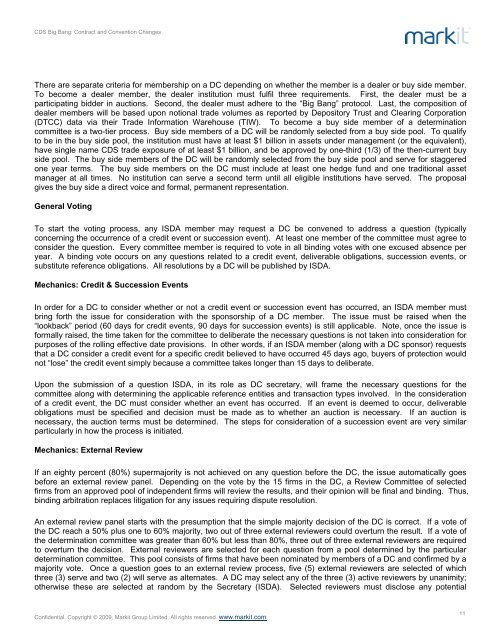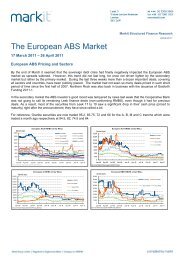The CDS Big Bang Research Report - Markit.com
The CDS Big Bang Research Report - Markit.com
The CDS Big Bang Research Report - Markit.com
Create successful ePaper yourself
Turn your PDF publications into a flip-book with our unique Google optimized e-Paper software.
<strong>CDS</strong> <strong>Big</strong> <strong>Bang</strong>: Contract and Convention Changes<br />
<strong>The</strong>re are separate criteria for membership on a DC depending on whether the member is a dealer or buy side member.<br />
To be<strong>com</strong>e a dealer member, the dealer institution must fulfil three requirements. First, the dealer must be a<br />
participating bidder in auctions. Second, the dealer must adhere to the “<strong>Big</strong> <strong>Bang</strong>” protocol. Last, the <strong>com</strong>position of<br />
dealer members will be based upon notional trade volumes as reported by Depository Trust and Clearing Corporation<br />
(DTCC) data via their Trade Information Warehouse (TIW). To be<strong>com</strong>e a buy side member of a determination<br />
<strong>com</strong>mittee is a two-tier process. Buy side members of a DC will be randomly selected from a buy side pool. To qualify<br />
to be in the buy side pool, the institution must have at least $1 billion in assets under management (or the equivalent),<br />
have single name <strong>CDS</strong> trade exposure of at least $1 billion, and be approved by one-third (1/3) of the then-current buy<br />
side pool. <strong>The</strong> buy side members of the DC will be randomly selected from the buy side pool and serve for staggered<br />
one year terms. <strong>The</strong> buy side members on the DC must include at least one hedge fund and one traditional asset<br />
manager at all times. No institution can serve a second term until all eligible institutions have served. <strong>The</strong> proposal<br />
gives the buy side a direct voice and formal, permanent representation.<br />
General Voting<br />
To start the voting process, any ISDA member may request a DC be convened to address a question (typically<br />
concerning the occurrence of a credit event or succession event). At least one member of the <strong>com</strong>mittee must agree to<br />
consider the question. Every <strong>com</strong>mittee member is required to vote in all binding votes with one excused absence per<br />
year. A binding vote occurs on any questions related to a credit event, deliverable obligations, succession events, or<br />
substitute reference obligations. All resolutions by a DC will be published by ISDA.<br />
Mechanics: Credit & Succession Events<br />
In order for a DC to consider whether or not a credit event or succession event has occurred, an ISDA member must<br />
bring forth the issue for consideration with the sponsorship of a DC member. <strong>The</strong> issue must be raised when the<br />
“lookback” period (60 days for credit events, 90 days for succession events) is still applicable. Note, once the issue is<br />
formally raised, the time taken for the <strong>com</strong>mittee to deliberate the necessary questions is not taken into consideration for<br />
purposes of the rolling effective date provisions. In other words, if an ISDA member (along with a DC sponsor) requests<br />
that a DC consider a credit event for a specific credit believed to have occurred 45 days ago, buyers of protection would<br />
not “lose” the credit event simply because a <strong>com</strong>mittee takes longer than 15 days to deliberate.<br />
Upon the submission of a question ISDA, in its role as DC secretary, will frame the necessary questions for the<br />
<strong>com</strong>mittee along with determining the applicable reference entities and transaction types involved. In the consideration<br />
of a credit event, the DC must consider whether an event has occurred. If an event is deemed to occur, deliverable<br />
obligations must be specified and decision must be made as to whether an auction is necessary. If an auction is<br />
necessary, the auction terms must be determined. <strong>The</strong> steps for consideration of a succession event are very similar<br />
particularly in how the process is initiated.<br />
Mechanics: External Review<br />
If an eighty percent (80%) supermajority is not achieved on any question before the DC, the issue automatically goes<br />
before an external review panel. Depending on the vote by the 15 firms in the DC, a Review Committee of selected<br />
firms from an approved pool of independent firms will review the results, and their opinion will be final and binding. Thus,<br />
binding arbitration replaces litigation for any issues requiring dispute resolution.<br />
An external review panel starts with the presumption that the simple majority decision of the DC is correct. If a vote of<br />
the DC reach a 50% plus one to 60% majority, two out of three external reviewers could overturn the result. If a vote of<br />
the determination <strong>com</strong>mittee was greater than 60% but less than 80%, three out of three external reviewers are required<br />
to overturn the decision. External reviewers are selected for each question from a pool determined by the particular<br />
determination <strong>com</strong>mittee. This pool consists of firms that have been nominated by members of a DC and confirmed by a<br />
majority vote. Once a question goes to an external review process, five (5) external reviewers are selected of which<br />
three (3) serve and two (2) will serve as alternates. A DC may select any of the three (3) active reviewers by unanimity;<br />
otherwise these are selected at random by the Secretary (ISDA). Selected reviewers must disclose any potential<br />
Confidential. Copyright © 2009, <strong>Markit</strong> Group Limited. All rights reserved. www.markit.<strong>com</strong><br />
11








